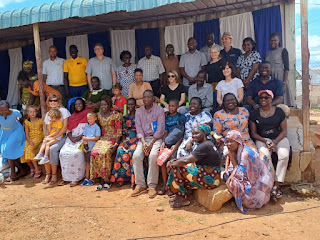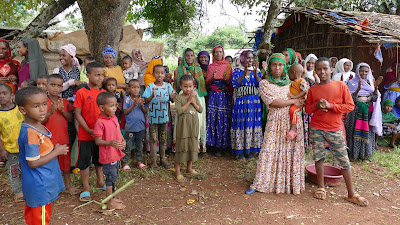 |
| Our final evening of Rep gathering |
This year, we returned to our normal pattern and our meeting
point was no tourist destination: we gathered in Juba, South Sudan. At the
moment, it is one of the most challenging places in our region to live and
work, though Tchad may be even harder. Perhaps it was good for us to get some
perspective on the difficulties of living in Ethiopia. At least we have decent
schools for kids and a more pleasant climate!
 |
| Wawa and daughter |
We have always brought our kids with us to these regional meetings. Unfortunately, this year David’s school shifted the dates of their October break and David had school with mid-term exams during the whole week of the meetings. So, we had to leave him behind, staying at home together with Bereket. We called him a few times a day, just to make sure things were under control, but the two teenagers did well.
Meanwhile, Paul and I were astonished by the mental and emotional lightness of traveling as a couple without kids, and only two carry-on bags. It has been probably 10 years since we went away alone for more than a night. Since we live at the hub of the continent’s best airline, it was also super easy for us to take the direct flight to Juba.
 |
| Traveling light |
It was really great to see our colleagues again, many of whom we have known for many years. Anne Marie and Scott have been colleagues since 2014 when they took over as Reps for Rwanda/Burundi. Then they followed us east, currently as Reps for Kenya/Tanzania. We met the families of Fred and Betty (Kenyan, serving in Uganda) and Amos (Ugandan, serving in South Sudan) back in 2018 when the Tanzania program hosted regional meetings. Winifred and Samuel have been serving in Tchad for the past two years. We also had a new colleague, an interim Representative for Burkina Faso, Cyprien, who comes from DR Congo originally. The regional Admin Assistant Kelly helped with a lot of logistics. Our Area Directors Wawa and Kristen were there with their four kids, who joined with Amos’ two kids to make a great kids’ team. We were sad that David was missing out on the solidarity. But several other families also decided to leave their kids behind – somehow, South Sudan is not the kind of place you bring your children to lightly.
 |
| Kristen and some project participants at WEP |
 |
| Gloria |
The situation on the ground is very difficult. But we were fortunate enough to be staying in a very nice hotel – one of those reviewed by the UN security team and deemed to be secure enough, both for meetings and for staying overnight. Paul and I really enjoyed making use of the nice gym each morning. We had one chance to walk next door and use the pool.
 |
| Mama Mary, a WEP participant |
Otherwise, most of our time was spent in meetings with our colleagues. We had time to share updates from our contexts. We discussed a wide variety of issues relevant to our common work with MCC. We had time for biblical reflection and prayer. Being an MCC Rep, with most of us sharing our positions with our spouse, is a very unique kind of mission/development assignment and it's always refreshing to talk with other people who really understand the dynamics we are dealing with.
We enjoyed sharing part of the week with our International Program Director Rebecca, as well as Joyfrida
from the security team and Melody, a peace coordinator. Paul and I actually
hired Melody for a position in Burundi a long time ago and were delighted to
spend a little time with her, now that she has come back to work with MCC.
During the week, we visited another development project, the Women’s Empowerment Program. At one point, this program served refugee women from South Sudan who were living in camps in Uganda, teaching them tailoring skills and giving them biblical and mindset training to help them have hope for their future. When refugees began to return to South Sudan in 2007, the Ugandan Program director got funding to follow them back to Juba.
 |
| The WEP sewing classroom |
Amos and his amazing staff team also put together several interesting tourist outings for us. One evening we had a nice dinner at a restaurant right on the Nile. The first thing we all saw, gleaming white in the dark, was a half-submerged river steamer. Apparently, it had been there for many years, getting stuck at a time when the Nile was a no-man’s land and anyone on the river would get shot at. It was no one’s top priority to get that boat free and so there it sits to this day.
 |
| Paul and the stuck steamer |
 |
| Our Nile River cruise |
On our final evening, we got special permission to enter the protected Mausoleum of John Garang, the Father of the Nation, who never got to see the day of actual independence. He died under suspicious circumstances returning from Uganda in a helicopter, a month before independence was declared. It is a quiet and somber memorial, and yet a beautiful place to visit in the sunset, with a curious pair of ostriches lurking around.
 |
| Melody, Mosleys and ostrich at the mausoleum |
All the rest of our colleagues are staying in South Sudan for the rest of the week, visiting camps and humanitarian distributions in remote areas, taking UN flights to get there, and sleeping in retrofitted containers. The adventure sounds fascinating, and we will miss the time to continue bonding with our fellow reps -- but David was waiting for us back at home and tomorrow morning, we are off for some RRL -- required renewal leave. More on that next time.
Bonus update: many of you know we were helping to raise funds for our housekeeper Yeshi to do the finishing work on her condominium so she can rent it out. Many thanks to all who contributed. Last Monday, we drove out to the condo to take a look and make estimates on the costs of the needed finishing work -- doors, windows, plaster, plumbing. Here are some photos to get an idea of how much needs to be done.
 |
| The Condo building -- Yeshi has a ground-floor apartment |
 |
| Yeshi and her son Yebetz at the front doorway of her apartment |
 |
| Paul and Mesfin on the balcony, discussing the minimum level of bars needed for security. |
More bonus photos from the Rep gathering
 |
| Melody and Rebecca |
 |
| Kelly, the Admin Assistant |
 |
| Dancing at WEP |
 |
| Sunken steamer seen from our boat |
At WEP












